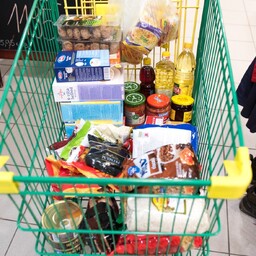Perekond Leis on kolmeliikmeline pere. Nad ostavad toitu mõneks päevaks. Toidukorvis on tihti kanamunad ja piimatooted. Anneli Leis ütleb, et hinnad on tõusnud. Ta mäletab, kui munad olid odavamad.
Piimatoodete puhul vaatab ta soodukaid
.
Maitse on oluline, kuid valik on suur
.
Piimatoodete puhul vaatab ta soodukaid
Tõlge fraasile: Piimatoodete puhul vaatab ta soodukaid
EN
For dairy products, she looks for discounts
Maitse on oluline, kuid valik on suur
Tõlge fraasile: Maitse on oluline, kuid valik on suur
EN
Taste is important, but the selection is large
Anneli ütleb, et kilo hind on oluline. Soodustel on tihti väiksemad kogused.
Ta tahaks osta rohkem puu- ja juurvilja
, kuid hind on kõrge. Ta kasutab marineeritud köögivilju. Ostukorvis oli Kreekast pärit kurk, mis oli soodushinnaga. Menüü on juba planeeritud, kuid vaja on veel mõnda asja. Eelarve oli 35 eurot, kuid lõppsumma oli 40 eurot ja 57 senti.
Ta tahaks osta rohkem puu- ja juurvilja
Tõlge fraasile: Ta tahaks osta rohkem puu- ja juurvilja
EN
She would like to buy more fruits and vegetables
Anneli ütleb, et ta pidi ennast tagasi hoidma. Ta teab, et raha peab jätkuma palgapäevani. Kui ta ostab rohkem, läheb summa 100 euroni. Toidukaupade müük on vähenenud. Inimesed ostavad vähem toitu.
Emotsiooniostud
, nagu juust või kohukesed, on harvemad.
Emotsiooniostud
Tõlge fraasile: Emotsiooniostud
EN
Impulse buys
Poeketid ütlevad, et ostutšeki pikkus on lühem. Välismaiseid tooteid on rohkem, sest need on odavamad.
Eesti toodete osakaal on langenud
, eriti munade ja või puhul. Tootjad ütlevad, et energiaaktsiisi tõus mõjutab neid kõvasti.
Kohalik tooraine on kallim
. Nad tahaksid pakkuda konkurentsivõimelist hinda, kuid see on raske.
Eesti toodete osakaal on langenud
Tõlge fraasile: Eesti toodete osakaal on langenud
EN
The share of Estonian products has decreased
Kohalik tooraine on kallim
Tõlge fraasile: Kohalik tooraine on kallim
EN
Local raw materials are more expensive
Anneli ütleb, et ta tahaks toetada kohalikku tootmist, kuid ta ei suuda seda endale lubada. Tootevalik muutub kitsamaks. Uusi tooteid tuleb vähem turule. Hinnatõusud mõjutavad kõiki. Juulis tõusevad bensiiniaktsiis ja käibemaks. Poeketid räägivad tarnijatega uute hindade osas. Selver ei plaani hindu muuta enne 1. juulit. Anneli kardab, et tulevad raskemad ajad.
The Leis family is a family of three. They buy food for a few days. The shopping basket often contains eggs and dairy products. Anneli Leis says that prices have risen. She remembers when eggs were cheaper. For dairy products, she looks for discounts. Taste is important, but the selection is large.
Anneli says that the price per kilogram is important. Discounts often have smaller quantities. She would like to buy more fruits and vegetables, but the price is high. She uses pickled vegetables. The shopping basket contained a cucumber from Greece, which was on sale. The menu is already planned, but some things are still needed. The budget was 35 euros, but the final amount was 40 euros and 57 cents.
Anneli says she had to restrain herself. She knows that the money has to last until payday. If she buys more, the amount goes up to 100 euros. Food sales have decreased. People buy less food. Impulse purchases, such as cheese or curd snacks, are rarer.
Store chains say that the length of the receipt is shorter. There are more foreign products because they are cheaper. The share of Estonian products has decreased, especially for eggs and butter. Producers say that the rise in the energy excise tax is affecting them severely. Local raw materials are more expensive. They would like to offer a competitive price, but it is difficult.
Anneli says she would like to support local production, but she cannot afford it. The product range is becoming narrower. Fewer new products are coming to the market. Price increases affect everyone. In July, the gasoline excise tax and VAT will rise. Store chains are discussing new prices with suppliers. Selver does not plan to change prices before July 1. Anneli fears that harder times are coming.

